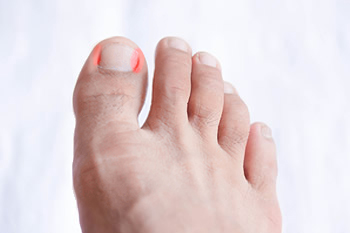
Ingrown toenails are typically classified based on severity and depth of nail penetration into the surrounding skin. A mild ingrown toenail involves redness, swelling, and slight tenderness where the nail edge presses against the skin. A moderate ingrown toenail may cause increased pain, drainage, and signs of infection as the nail begins to pierce the skin. A severe ingrown toenail often includes significant inflammation, pus, overgrowth of tissue, and difficulty walking due to intense discomfort. Chronic cases may result in repeated infections or thickened skin. Each stage may require a different approach to care, from at-home soaking and nail trimming to professional treatment such as partial nail removal. If you are experiencing persistent or painful symptoms, it is suggested that you see a podiatrist for a diagnosis and treatment to prevent further complications and restore comfort.
Ingrown toenails can become painful if they are not treated properly. For more information about ingrown toenails, contact Brain Middleton, DPM of Medical Foot Care Center. Our doctor can provide the care you need to keep you pain-free and on your feet.
Ingrown Toenails
Ingrown toenails occur when a toenail grows sideways into the bed of the nail, causing pain, swelling, and possibly infection.
Causes
- Bacterial infections
- Improper nail cutting such as cutting it too short or not straight across
- Trauma to the toe, such as stubbing, which causes the nail to grow back irregularly
- Ill-fitting shoes that bunch the toes too close together
- Genetic predisposition
Prevention
Because ingrown toenails are not something found outside of shoe-wearing cultures, going barefoot as often as possible will decrease the likeliness of developing ingrown toenails. Wearing proper fitting shoes and using proper cutting techniques will also help decrease your risk of developing ingrown toenails.
Treatment
Ingrown toenails are a very treatable foot condition. In minor cases, soaking the affected area in salt or antibacterial soaps will not only help with the ingrown nail itself, but also help prevent any infections from occurring. In more severe cases, surgery is an option. In either case, speaking to your podiatrist about this condition will help you get a better understanding of specific treatment options that are right for you.
If you have any questions, please feel free to contact our office located in Rome, GA . We offer the newest diagnostic and treatment technologies for all your foot care needs.

